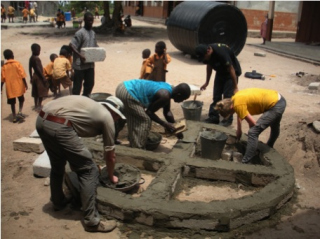About Ekumfi Egyankwaa
Egyankwaa is a small community of about 89 homes with a population of
approximately 1300 people. As it is closely located to the Gulf of Guinea,
community members' options to collect fresh water is limited since many of
the underground water sources are saline and not useable for basic
consumption needs.
Egyankwaa's community members are mainly dependent on farming for
sustenance. The primary goods and food products produced in Adansemaim
are cassava and maize. Egyankwaa currently has no health clinic but
community members can visit the neighboring community Esueshiy, which
has a large health clinic. Furthermore, there is no Hygiene and Sanitation
Committee established by Global Brigades, however there is a Cleaning
Committee. This is a volunteer group that ensures the cleanliness of the
community. There are no household of community latrine facilities and
most community members use "the bush" for defecation.These unhealthy
sanitation practices can lead to diseases such as typhoid, diarrhea, cholera
and other infectious diseases.
Global Brigades currently operates Medical, Dental, Microfinance, Business
and Water Brigades in the community. Egyankwaa also has a Community
Development Fund established through the Microfinance program, which
offers savings and social enterprise loans.
Ekumfi Egyankwaa's Water Challenge
The two main water challenges in the Ekumfi district are: water access
and water quality. Where piped water is not available, rainwater is the most
culturally accepted form of drinking water. When rainwater is not available,
community members will often go to rivers or small dug out ponds for water.
The main water issues faced by most communities in the Ekumfi District are
directly related to its geographic location, especially its close proximity to the sea. Salty seawater has intruded most communities' underground water resources, making most groundwater sources unusable for basic consumption needs and a possible health hazard. Besides ground water posing a possible threat to peoples' health, so do most surface water sources like rivers, ponds and streams. When Global Water Brigades entered the community of Egyankwaa, its residents fetched water for domestic consumption out of a stagnant pond on the west-side of the community. The water from this pond is subject to high levels of contamination and is rarely treated before consumption. Using this water for personal consumption can lead to diarrhea, bilharzia, cholera, skin rash and other water related diseases and infections. Furthermore, women and children can spend many hours a day collecting this water in open containers and carrying it back home. One of the few safe water options for Egyankwaa's community members is purchasing water sachets but this is an unsustainable practice as well as an unreliable and in the long-term expensive form of drinking water.
The Water Solution for Ekumfi Egyankwaa

Water Brigades Ghana has focused on three types of water solutions in the Ekumfi District : School Rainwater Harvesters, Community-wide Rainwater Harvesters and Household Rainwater Harvesters. In January 2011, Pennsylvania State University and Indiana University constructed a Community-wide Rainwater Harvester (CWRH) in Egyankwaa as well as helped set up a water committee consisting of a president, treasurer, secretary and two agents responsible for selling the water from the system. The generated funds are used to maintain the system as well as to fill up the system's storage tanks with purchased water from tanker trucks during the dry season, which is again sold to the community.
In June 2012, Cardiff University constructed a School Rainwater Harvester as well as help set up a School Water Club responsible for gathering clean water for each classroom. Each class had also been given a Family Lifestraw water filter or Sawyer filter to use.
Current Status
Last Visit: October, 2013
All systems are running very well. Egyankwaa has received piped water by the Ghana Water Company Limited, and the community is now using all tanks as water storage units as well, since the water pressure is not consistent and water does not always flow from the tap.
Project Photos
Visit Other Programs in Ekumfi Egyankwaa
Global Brigades strives to implement a model of Holistic Development in communities through a system of collectively implementing health, economic, and education initiatives to strategically meet a community's development goals. Learn more about the other programs being implemented in Ekumfi Egyankwaa:
![]() Business
Business CHW
CHW ![]() Dental
Dental ![]() Medical
Medical ![]() Microfinance
Microfinance![]() Public Health Initiative
Public Health Initiative
| Project Overview | |
|
Beneficiaries CWRH and SRH |
500 CWRH 350 SRH |
| Volunteers | 42 |
| Project Cost |
4200 USD |
|
# of systems |
1 SRH 1CWRH |
| Additional Information |
| General Community Profile |
| Family Profiles |
| Water Brigade Update Report |
| Pre-Brigade Lesson Plan |
| On-Brigade Lesson Plan |
| Rainwater Harvester Construction in Ekumfi Adansemaim |
|||
| Water Brigades Chapter | Month | Volunteers | # Tanks Constructed |
|
Indiana University Pennsylvania State University |
December, 2011 |
11 24 |
1 CWRH |
|
Cardiff University |
June, 2012 |
7 |
1 SRH |
